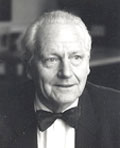
Gerd Albers (1919-2015)
On January 31st 2015, Professor Gerd Albers passed away peacefully in Munich. He was one of the founders of ISOCARP and followed Sam van Embden (1904-2000) as the second President of this then young organization (1975-1978). Exactly 15 years younger than Sam van Embden, he reached the same age of 95, and remained professionally active up to the end.
Born in Hamburg on September 20th 1919 and graduating from Johanneum, the most famous classical gymnasium (high school) of his home town, Gerd Albers had intended to study architecture. However, as he feared to be forced into a Nazi student organization or party membership, he decided on an escape route, by joining the Navy, just two years before the Second World War began. He then spent the next nine years as a Navy officer, including the first post-war year on de-mining services in the North Sea. (*)
So, it was with a considerable delay that he finally got to embark on his studies of architecture in Hanover. In 1947, he was one of the very first German scholarship awardees in the post War era to study architecture and urban design in the USA where he became a student of the famous German émigré professors at the Illinois Institute of Technology in Chicago – Mies van der Rohe and Ludwig Hilberseimer, to name a few. He obtained a Masters degree even before completing his German Dipl.-Ing. Later on, in parallel with his increasing responsibilities in public planning practice, Gerd Albers completed a doctoral dissertation on the intellectual history of planning thought (1957) – a brilliant analysis of the origins of the movements and fashions in urban planning and design.
After a succession of ever more responsible positions in urban planning practice in the cities of Ulm, then Trier, and finally as Director of Urban Development at Darmstadt, he was appointed Professor of Urban and Regional Planning at the Technical University of Munich in 1961 where he went to teach for 27 years. He also served as Rector for four years – providing his superb managerial capabilities well beyond the boundaries of his field, at a time of fundamental changes in the history of that university.
Long before he finally retired from his full-time position in 1988, Gerd Albers was already considered the pre-eminent German academic in urban and regional planning but he never lost touch with the evolving planning practices in Germany and abroad. The orientation of ISOCARP as a professional international organization of both academics and practitioners clearly mirrored the views of this and other founders. Gerd Albers was an internationally acclaimed representative of the growing field of urban and regional planning who was both highly intellectual and a practically minded planner.
His work for ISOCARP firmly linked professional practice and academic excellence apart from emphasizing international cooperation in a united Europe (West and East), and beyond. His influence on the association was felt for many years, drafting the multi-national structure, the State of the Profession (1978), editing the Bulletin (1991-2000), and since 1999 (his 80th birthday), through the Gerd Albers Award that was established in his honour for the best publications by ISOCARP members. His contributions to ISOCARP include a good number of papers at the annual conferences as well as Bulletin articles, but above all, his direct influence on all those members who interacted with him over so many years.
His numerous civic and academic honours and leading positions in scientific organizations reflect the public recognition of his work as much as his books and numerous conference papers and journal articles. He was a powerful speaker and brilliant writer, a sharp editor, and a good listener (which was one of his criteria for defining a good planner).
The ISOCARP community will miss Gerd Albers as one of the wise men who had tremendous influence on the style and tradition of the association as it moves to its 50th anniversary celebration. We will never forget him.
——————–
(*) As research associates at his university institute in Munich we were puzzled by the unusual military career path of our revered professor but, only recently, he told me about his real motivation.
H. Detlef Kammeier, Bangkok